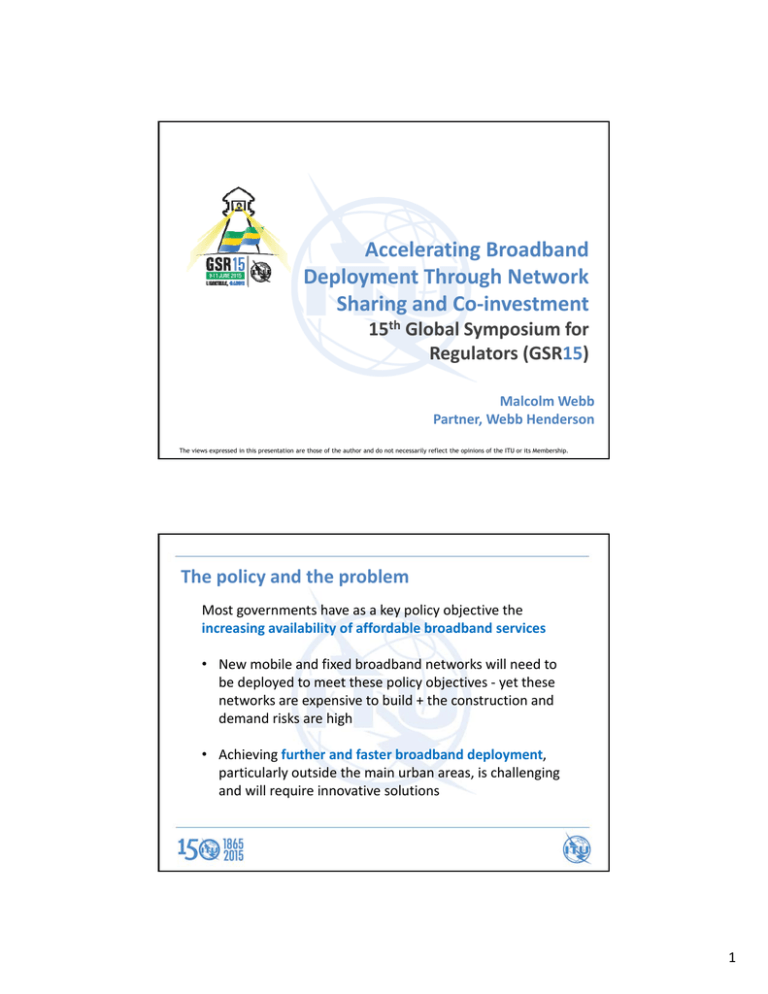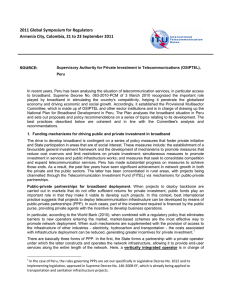Accelerating Broadband Deployment Through Network Sharing and Co‐investment 15
advertisement

Accelerating Broadband Deployment Through Network Sharing and Co‐investment 15th Global Symposium for Regulators (GSR15) Malcolm Webb Partner, Webb Henderson The views expressed in this presentation are those of the author and do not necessarily reflect the opinions of the ITU or its Membership. The policy and the problem Most governments have as a key policy objective the increasing availability of affordable broadband services • New mobile and fixed broadband networks will need to be deployed to meet these policy objectives ‐ yet these networks are expensive to build + the construction and demand risks are high • Achieving further and faster broadband deployment, particularly outside the main urban areas, is challenging and will require innovative solutions 1 Options available to governments Options available to governments include: • Build their own broadband network (and make available on an open access basis), e.g. • in access, NBN in Australia and QNBN in Qatar • In backhaul/backbone, in Brazil, Argentina and India • Incentivise (e.g., through grants) a single network operator to build, e.g. • In Malaysia, TM rolling out a high speed broadband network • In New Zealand, Chorus rolling out a FTTP network Network sharing/co‐investment as an option Another option is for government to encourage or incentivise network sharing and co‐investment by multiple operators and potentially other sources, including the government itself, in building this new infrastructure • Commercially‐driven mobile network sharing has been prevalent, particularly in those countries with very competitive mobile markets • Still relatively rare for co‐investment to occur in the fixed sector 2 Benefits of sharing from government’s perspective There are a number of advantages from successful sharing arrangements from government’s perspective, including: • Particularly in the fixed sector, these arrangements enable or facilitate investment into the industry from new sources (e.g., utilities, local government, infrastructure funds) • Co‐investment is a “big tent” approach, where industry players negotiate and co‐operate in deployment and operation of the shared infrastructure ‐ in the absence of anti‐trust concerns, a consensus‐based outcome is usually superior to a regulated outcome • To the extent that the incumbent is a party to the co‐investment arrangement, it can result in a lessening of market power ‐ with a corresponding reduction in regulatory burden for the regulator and for industry Why doesn’t it happen more often? Why doesn’t sharing happen more often, or in other circumstances, and why do a number of sharing deals not seem to last? • Loss of independence – a sharing operator will no longer have full control over the direction that its network will take, its rollout strategies and vendor choices • Need to reach agreement on when/where to invest is time consuming + a prime area for contentious disputes • Partner selection ‐ a compatible sharing partner will alleviate some of these concerns – involves considerations of alignment on network evolution and deployment + investment plans and strategies Source: ITU. 3 Why doesn’t it happen more often, con’t • Difficulty in reaching agreement with a competitor ‐ due to the healthy distrust that each management team has of the other • sharing deals often involve transfer of existing assets into a JV structure ‐ disagreements over asset valuation are one of the main reasons why non‐Greenfields sharing deals do not proceed • Incumbent reluctance ‐ In the fixed sector, where usually limited infrastructure competition, incumbents can be reluctant to depart from status quo and consider novel co‐investment options ‐ particularly where they are likely to lose control Is sharing the solution? To date, governments have generally encouraged sharing, in a light‐touch way • But should governments go further and actively incentivise/facilitate sharing as a way of achieving “further and faster” broadband coverage? If it can be achieved, sharing may well be a superior solution – if the market is not meeting government’s broadband policy objectives • Government‐build networks are an expensive and high‐risk alternative • Incentivising a single network operator, if they participate in downstream markets, raises the potential for discriminatory behaviour, favouring the operator’s retail activities • requiring an intensive ongoing regulatory burden as compared to a sharing arrangement 4 What steps can governments take? Government co‐venturing ‐ Co‐venture with private sector operators to encourage broadband deployment, particularly in Greenfields areas ‐ governments have valuable assets/infrastructure that, if available through sharing, would speed up + potentially reduce the cost of, broadband deployment Use of spectrum licensing ‐ A lighter‐touch may be all that is required from government to encourage mobile network sharing ‐ one of the most potent means available to the government is through 4G spectrum licensing conditions, e.g. by requiring widespread national coverage, creating a strong incentive to share; or requiring a licensee to build in one rural province, entitling them to roam in other provinces Regulatory certainty ‐ Provide high degrees of up‐front regulatory certainty for co‐ investing entities, to address the risk of regulatory intervention post sunk investment – e.g., provide clarity that any access pricing will recognise the build and demand risk at the time of investment or allow long‐term regulatory commitments from sharing entities Conclusion Incentivising sharing is one of the key options available to governments to achieve “further and faster” broadband coverage • However, it is clearly a challenge for sharing operators to create, implement and maintain a successful sharing arrangement ‐ given all the benefits available to operators, it is somewhat surprising that sharing does not occur more frequently • It is more difficult to achieve co‐investment in fixed networks, where there is less infrastructure competition than in mobile This is an area where government incentives, including in‐kind contributions, could bring about a breakthrough ‐ there is particular merit in governments (including through utilities) co‐venturing with telecoms operators to facilitate the rapid rollout of fixed broadband networks 5

